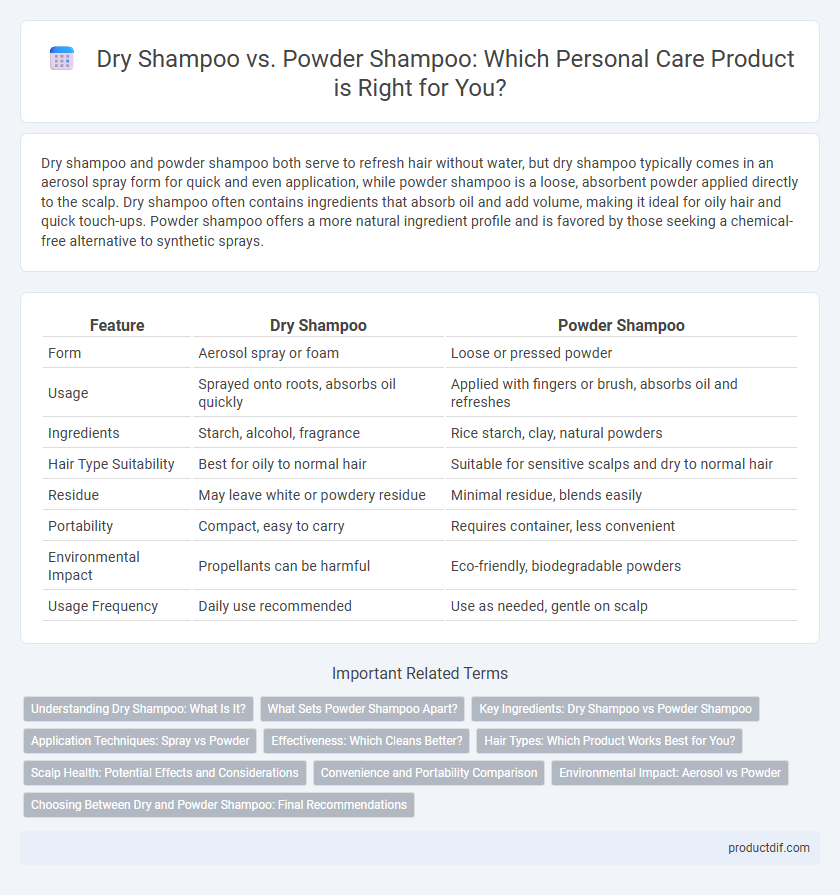Dry shampoo and powder shampoo both serve to refresh hair without water, but dry shampoo typically comes in an aerosol spray form for quick and even application, while powder shampoo is a loose, absorbent powder applied directly to the scalp. Dry shampoo often contains ingredients that absorb oil and add volume, making it ideal for oily hair and quick touch-ups. Powder shampoo offers a more natural ingredient profile and is favored by those seeking a chemical-free alternative to synthetic sprays.
Table of Comparison
| Feature | Dry Shampoo | Powder Shampoo |
|---|---|---|
| Form | Aerosol spray or foam | Loose or pressed powder |
| Usage | Sprayed onto roots, absorbs oil quickly | Applied with fingers or brush, absorbs oil and refreshes |
| Ingredients | Starch, alcohol, fragrance | Rice starch, clay, natural powders |
| Hair Type Suitability | Best for oily to normal hair | Suitable for sensitive scalps and dry to normal hair |
| Residue | May leave white or powdery residue | Minimal residue, blends easily |
| Portability | Compact, easy to carry | Requires container, less convenient |
| Environmental Impact | Propellants can be harmful | Eco-friendly, biodegradable powders |
| Usage Frequency | Daily use recommended | Use as needed, gentle on scalp |
Understanding Dry Shampoo: What Is It?
Dry shampoo is a personal care product formulated to absorb excess oil and refresh hair without water, typically containing starches or alcohol-based ingredients. Unlike traditional shampoo, it eliminates the need for washing by soaking up scalp oils and adding volume, making it ideal for quick touch-ups or extended styling. Powder shampoo, often a variant of dry shampoo, uses finely milled powders to cleanse and absorb oils, offering a lightweight alternative that reduces residue and improves scalp breathability.
What Sets Powder Shampoo Apart?
Powder shampoo distinguishes itself with its lightweight, finely milled formula that absorbs excess oil and impurities without weighing hair down, making it ideal for quick refreshes between washes. Unlike traditional dry shampoos that often contain aerosols, powder shampoos use natural ingredients like rice starch or kaolin clay to cleanse and volumize hair gently. This eco-friendly alternative minimizes residue buildup and provides a customizable application, enhancing hair texture and extending the time between washes.
Key Ingredients: Dry Shampoo vs Powder Shampoo
Dry shampoo commonly contains ingredients like silica, starch, and alcohol-based compounds that absorb excess oil and provide a lightweight, matte finish. Powder shampoo often features natural powders such as rice starch, kaolin clay, or arrowroot, which effectively absorb oil while adding volume and texture to hair. Both products emphasize oil absorption but differ in texture and ingredient origin, with powder shampoos leaning toward more natural, mineral-based components.
Application Techniques: Spray vs Powder
Dry shampoo typically comes in a spray form, allowing for quick and even application by misting onto the roots to absorb oil and refresh hair. Powder shampoo is applied by sprinkling or dusting the powder directly onto the scalp and hair, then massaging to distribute and absorb excess grease. Spray dry shampoos offer a lightweight, mess-free option, while powder shampoos provide targeted volume and are preferred for precise control over application.
Effectiveness: Which Cleans Better?
Dry shampoo uses lightweight starches or alcohol-based ingredients to absorb excess oil and refresh hair without water, offering quick oil control but may leave residues on the scalp. Powder shampoo, typically made from natural clays or fine powders, provides deeper cleansing by absorbing both oil and dirt, resulting in a fresher, less weighed-down feeling. For effectiveness in cleaning, powder shampoo generally outperforms dry shampoo due to its ability to remove grime more thoroughly while maintaining hair volume.
Hair Types: Which Product Works Best for You?
Dry shampoo works best for oily hair by absorbing excess sebum and refreshing roots without water, making it ideal for fine or straight hair needing volume. Powder shampoo offers a gentler alternative suitable for sensitive scalps and curly or textured hair, providing cleansing without stripping natural oils. Choosing between dry shampoo and powder shampoo depends on hair type, scalp sensitivity, and desired level of moisture retention.
Scalp Health: Potential Effects and Considerations
Dry shampoo typically contains alcohol and starch-based ingredients that absorb excess oil but may cause scalp dryness or irritation if overused, impacting scalp health. Powder shampoo, often formulated with natural clays and botanical extracts, can gently cleanse and balance scalp oils while providing soothing benefits that support scalp barrier function. Choosing the right product depends on individual scalp sensitivity and the frequency of use to maintain optimal scalp hydration and prevent buildup.
Convenience and Portability Comparison
Dry shampoo offers superior convenience with its quick spray application, making it ideal for on-the-go use without the need for water. Powder shampoo, while often lighter and more compact, requires more effort to distribute evenly, potentially limiting its portability for fast-touchups. For travelers and busy individuals, dry shampoo's mess-free spray design enhances portability and ease of use compared to powder alternatives.
Environmental Impact: Aerosol vs Powder
Dry shampoo aerosols often contain propellants and volatile organic compounds (VOCs) that contribute to air pollution and increase greenhouse gas emissions. Powder shampoos typically use minimal packaging and avoid harmful chemicals, making them a more sustainable option with a lower carbon footprint. Choosing powder shampoo reduces plastic waste and limits environmental damage linked to aerosol distribution systems.
Choosing Between Dry and Powder Shampoo: Final Recommendations
Dry shampoo offers quick oil absorption and convenience for on-the-go freshness, making it ideal for busy lifestyles and oily hair types. Powder shampoo provides a more natural, chemical-free option suitable for sensitive scalps and those seeking gentle cleansing with natural ingredients like rice starch or clay. Choosing between dry and powder shampoo depends on hair type, scalp sensitivity, and personal preference for ingredient composition and application style.
Dry Shampoo vs Powder Shampoo Infographic

 productdif.com
productdif.com